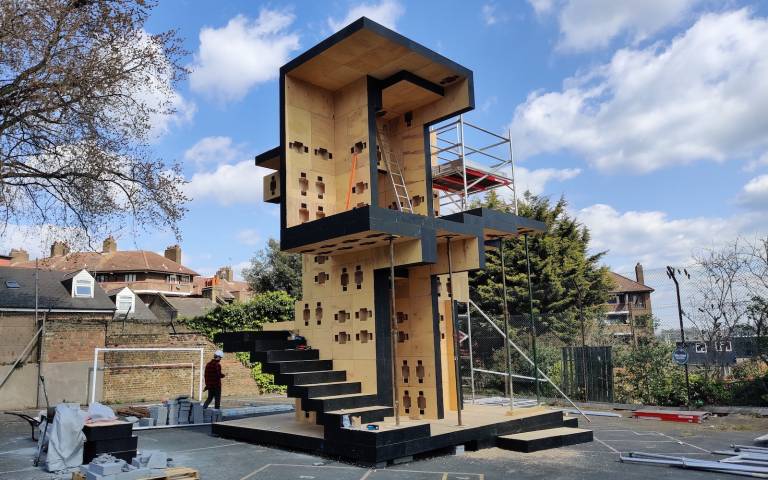The Bartlett’s Automated Architecture Lab Showcases New Housing Prototype in East London
14 April 2021
Automated Architecture (AUAR) Lab, a research laboratory at The Bartlett School of Architecture, will present a series of takeovers this spring to showcase a new housing prototype, House Block.

AUAR is a research laboratory at The Bartlett, directed by Lecturers in Architecture Mollie Claypool, Gilles Retsin, Manuel Jimenez and Senior Research Fellow in Public Engagement Claire McAndrew. In partnership with Hackney Council, as a part of an exploration of digital approaches to community-led developments, the lab presents House Block, a temporary housing prototype in Clapton, East London from April — May 2021.
House Block is designed and built using AUAR Lab’s Block Type A modular housing system, and demonstrates the potential of participatory approaches to housing, where local communities utilise digital modes of production. The four takeovers illustrate this potential, showing how the blocks morph over time into different configurations to support different needs, provocations and conversations.
The takeovers run from 19 April to 16 May:
- 19 – 25 April, hosted by The Building Centre
- 26 April – 2 May, hosted by Gonzalo Herrero Delicado + Pati Santos
- 3 – 9 May, hosted by Studio Wayne McGregor
- 10 – 16 May, hosted by L U C I N E
Currently under construction on Bakers Hill, Clapton, House Block is designed and built using a discrete housing system, a kit of parts analogous to lego, known as Block Type A. Each block is milled from a single sheet of plywood using CNC machines and assembled by hand, then post-tensioned. These are considered to be ‘discrete’ because the blocks are not fixed, instead offering the opportunity to be assembled, dismantled, reconfigured and reassembled over and over again.
House Block asks what our environment could look like if our homes were not static structures, but could evolve over time; what if there was no set design, but an ecology of elements that constantly reorganise through automation? Could we consider a future that democratises access to building systems, one that alleviates the housing crisis and supports more equitable labour practices threatened by ever increasing automation?
Opening Event
AUAR Labs are hosting an opening evening for the public at House Block, Bakers Hill, Clapton from 18:00 – 21:00 on 22 April with a local DJ at the public event from 19:00 – 21:00. For details about press tours, please contact Mollie Claypool.
Register for the opening evening
Further events
AUAR will also offer taster sessions and a public programme of events.
Taster Sessions
At the taster sessions, members of the public will be able to meet the designers and get hands-on with Block Type A as the takeovers are constructed. These sessions run from 10.00am - 1.00pm on the following dates:
- Saturday 17 April
- Monday 19 April
- Saturday 24 April
- Monday 26 April
- Saturday 1 May
- Tuesday 4 May
- Saturday 8 May
- Monday 10 May
Book tickets for taster sessions
Taster sessions are paid opportunities, £50 per session, with a maximum of three people at each session.
Public Programme
The public programme will run in collaboration with House Block’s project partners from 17 April — 16 May 2021. The events include talks, tours, performances and installations exploring housing needs and the applications of technology and governance, moving between near-future solutions and more speculative visions. Please see automatedarchitecture.io/hackney for further details and event registrations.
House Block is delivered in partnership with Hackney Council as a part of an exploration of digital approaches to community-led developments. It is supported by UCL Trellis: Community Partnership Building Events, EPSRC Impact Acceleration Account Follow-On Funding, UCL East Community Engagement Seed Fund, UCL Innovation & Enterprise HEIF Funding.
Image: House Block under construction, by Mollie Claypool
 Close
Close

